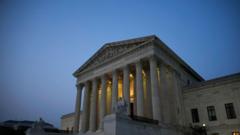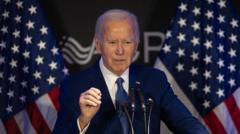In a crucial case, the Supreme Court evaluates whether the President can unilaterally end birthright citizenship, a move that could reshape immigration rights in the U.S.
Supreme Court Weighs Trump's Birthright Citizenship Challenge

Supreme Court Weighs Trump's Birthright Citizenship Challenge
The U.S. Supreme Court hears pivotal arguments on ending birthright citizenship amid ongoing immigration policy debates.
In a significant session, the U.S. Supreme Court is deliberating on Donald Trump's controversial executive order aimed at terminating birthright citizenship. This executive initiative, signed shortly after Trump's return to the White House in January, seeks to strip citizenship from children born in the U.S. to undocumented immigrants. The case has been propelled into the public eye following intervention from three federal judges who issued nationwide injunctions preventing the order's enforcement, challenging Trump's assertion that these lower courts lack such authority.
Legal experts maintain that the president's attempt may be undermined by the constitutional guarantees of the 14th Amendment, which affirms that all individuals born or naturalized in the United States are citizens. Trump interprets a specific clause, "jurisdiction thereof," to suggest that children of undocumented immigrants could be excluded from automatic citizenship—a stance that faces substantial skepticism from constitutional scholars.
The Supreme Court's decision could empower Trump to push through further executive actions without congressional approval, potentially altering immigration policy with limited judicial oversight. The rarity of May hearings raises questions about the timeline for a ruling, and with Trump's nominations shaping the court's conservative majority, legal predictions are cautious.
The Justice Department insists that the growing phenomenon of universal injunctions is hampering Trump's policy execution, labeling this as a significant hurdle to presidential authority. The case at hand stems from three lawsuits led by immigration advocates along with 22 states, raising the stakes for upcoming immigrants.
The impact of potentially revoking birthright citizenship could be considerable, with advocates warning that it might create a generation of children categorized as second-class citizens, risking situations of statelessness. Immigration law expert Alex Cuic emphasizes that such outcomes could complicate deportation processes, particularly if these children could not be repatriated to their parents' home countries.
With Trump's administration aggressively pursuing this challenge to birthright citizenship, the nation watches closely as the Supreme Court prepares to deliver a ruling that could forever change the landscape of American citizenship rights.
Legal experts maintain that the president's attempt may be undermined by the constitutional guarantees of the 14th Amendment, which affirms that all individuals born or naturalized in the United States are citizens. Trump interprets a specific clause, "jurisdiction thereof," to suggest that children of undocumented immigrants could be excluded from automatic citizenship—a stance that faces substantial skepticism from constitutional scholars.
The Supreme Court's decision could empower Trump to push through further executive actions without congressional approval, potentially altering immigration policy with limited judicial oversight. The rarity of May hearings raises questions about the timeline for a ruling, and with Trump's nominations shaping the court's conservative majority, legal predictions are cautious.
The Justice Department insists that the growing phenomenon of universal injunctions is hampering Trump's policy execution, labeling this as a significant hurdle to presidential authority. The case at hand stems from three lawsuits led by immigration advocates along with 22 states, raising the stakes for upcoming immigrants.
The impact of potentially revoking birthright citizenship could be considerable, with advocates warning that it might create a generation of children categorized as second-class citizens, risking situations of statelessness. Immigration law expert Alex Cuic emphasizes that such outcomes could complicate deportation processes, particularly if these children could not be repatriated to their parents' home countries.
With Trump's administration aggressively pursuing this challenge to birthright citizenship, the nation watches closely as the Supreme Court prepares to deliver a ruling that could forever change the landscape of American citizenship rights.




















